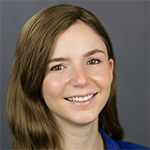Although not explicitly taught, advocacy is an essential component of medical education. I would argue that the best residents are the strongest advocates. They are caring, efficient, thorough and do what is needed as soon as it is needed. Working in a rigid system with an established hierarchy, it is sometimes difficult to see the big picture, and know how to take our advocacy roles to the next level. That's where the Academy’s Advocacy Ambassador Program comes in.
As an ophthalmology resident in Washington, DC, I am constantly growing into the ever-expanding role of patient advocate — with evolving expectations and no apparent end in sight.
My patients’ problems become mine as I spend countless hours completing prior authorizations, non-formulary requests, pharmacy inquiries, letters of medical necessity, disability appeals, and even more precious time on the phone, including discussions with a physician on a peer-to-peer review about why my patient with Graves disease and signs of acute compressive optic neuropathy needs a CT scan.
I do it because I care and because no one else will. But I get tired, and I sometimes feel worn down by the constant reminder of the dysfunction in our healthcare system, as well as my own fears of the changes that will affect my ability to provide the best care for my patients. I found myself asking what more could I do? Do I really have something to offer? Who am I to point out these problems and insist that we do better?
Then came the Academy’s L.E.A.P. Forward program, a component of the Advocacy Ambassador Program. First introduced at Mid-Year Forum 2015, L.E.A.P. Forward has evolved into one of the most-anticipated sessions. Essentially, it is a full morning devoted to trainees with a focus on personal and professional leadership development.
Well-respected leaders in ophthalmology, who also seem to have experience in life coaching, introduce each of the main topics: Leadership, Engagement, Advocacy, and Practice Management. Each talk is followed by a panel discussion and networking break, in which participants can engage group leaders with more targeted and personal discussions.
The program addresses specific ways for trainees and young ophthalmologists to further their journeys as advocates and leaders. To put it simply, this requires that we: 1. Show up; 2. Speak up; and 3. Follow up.
We are also reminded that we will, in fact, mess up, and that is normal, expected and okay. The moment the session began, I felt a new sense of purpose and a feeling of empowerment that has only grown since.
As residents, we are deeply in tune with the challenges our patients face while navigating the system. We are actively immersed in an often confusing and frustrating health care system. Our perspectives are valuable and fresh, without the weight of years of practice and conflicting priorities.
If the best residents are the strongest advocates, then we should absolutely steer them in the right direction to get stuff done, while also cultivating their leadership skills, providing mentorship opportunities, and fostering a community of giving and service. I'm glad I took the leap, and I can't wait to bring the message home.
 |
About the author: Marielle Mahan, MD, is a PGY-3 ophthalmology resident at MedStar Georgetown University Hospital/Washington Hospital Center in Washington, DC. She was sponsored to attend the Mid-Year Forum by the American Society of Ophthalmic Trauma. |